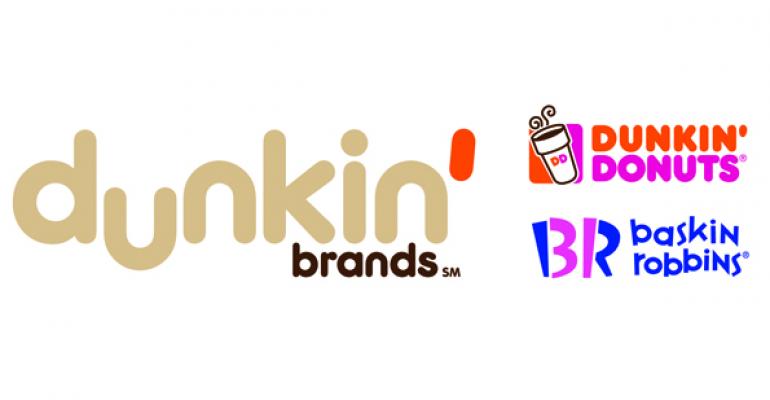Despite the continuing global economic headwinds and fierce competitive landscape, Dunkin’ Brands Group Inc. posted significantly higher earnings and an increase in revenues for its third quarter.
At the same time, the Canton, Mass.-based company reported same-store sales gains across its domestic and international Dunkin’ Donuts and Baskin-Robbins systems.
For the three months ended Sept. 29, the quick-service company said net income jumped to $29.5 million, up from $7.4 million in the three-month period a year ago. Per share earnings for the quarter were 26 cents compared with a loss of $1.01 last year — the result of an accounting adjustment tied to its initial public offering last July.
RELATED
• Dunkin' Donuts steps up expansion at universities
• Dunkin’ Donuts rolls out seasonal menu items
• More restaurant industry finance news
Revenue for the third quarter rose by 5 percent to $171.7 million, from $163.5 million, as a result of improved systemwide sales, higher royalty income and additional company-owned outlets, Dunkin’ Brands said.
The company adjusted its guidance, saying it now expects per-share earnings of between $1.25 and $1.27, an increase from $1.22 to $1.25 projected previously. Shares were trading at $31.15, rising about 3 percent, at midday Thursday.
Nigel Travis, chief executive of Dunkin’ Brands and president of Dunkin’ Donuts, told investors during an earnings call Thursday that he believed the company had “executed on all cylinders, resulting in a strong performance” during the period.
That performance, he added, “was against the backdrop of slowing overall QSR growth and increased competitive activity.”
The rise in global systemwide sales growth in the quarter was a result of Dunkin’ Donuts’ domestic same-store sales increases, global unit development and a hike in Baskin-Robbins International sales, the company said.
Dunkin’ Donuts’ domestic business posted same-store sales growth of 4.7 percent for the three months compared with 8.9 percent for the same period last year. The recent increase was attributed to a higher ticket averages and a hike in traffic, despite the unstable economic picture.
Travis told investors that the high unemployment rate and the pervasive uncertainty surrounding the economy is continuing to negatively impact consumer spending. He also touched on the looming budget crisis in Washington, D.C., but forecast that “whatever the result of the election, whoever wins, there will be a more moderate approach to resolving the deficit crisis than we’ve seen in the past.”
Ramping up growth
Travis attributed the growth in the domestic Dunkin’ Donuts’ business to the company’s focus on beverage sales growth — led by cold beverages — its breakfast sandwiches, the chain’s Bakery Sandwiches line, and sales of Dunkin’ Donuts K-Cup portion packs for Keurig single-serve brewers. Travis said K-Cups contributed 0.4 percent to same-store sales in the quarter.
He also said Dunkin’ was opening domestic branches more rapidly than planned and revised the company’s guidance, saying he expected development of between 280 and 300 net new units this year. Previously, the company had expected to open between 260 and 280 net new units.
Baskin-Robbins’ U.S. same-store sales grew 2.8 percent in the quarter, fueled by the brand’s new Flavors of the Month, signature cake merchandising and new beverage messaging around Flavors of the Month being available as milk shakes.
Baskin-Robbins is expected to close between 40 and 60 net U.S. locations this year.
Dunkin’ Donuts international grew same-store sales by 2.1 percent while Baskin Robbins International comps rose by 3 percent.
Neil Moses, chief global strategy officer, said the company had made a $2 million investment in its Spanish franchisee to help hasten expansion in that country. “We will be opportunistic when we can help accelerate growth in a market or when a strong partner needs assistance,” he said.
Travis told analysts he was excited about Dunkin’ Donuts’ new smartphone app, which was launched in August. He said that the app had been downloaded 600,000 times since it was introduced.
“This is a new dawn,” Travis said. “I feel quite strongly that this will help us with [same-store sales] down the road. It’s getting us into one-on-one marketing and making it easier for our customers to engage with us. The app will speed up transactions. And mobile offers are coming.”
And while Travis said he generally feels very good about the business, he voiced frustration when asked about the sugary beverage ban in New York City. “We think it’s the wrong way to go,” he said. “The country has an obesity problem, but this isn’t the way to tackle it. The American Beverage Association has filed a lawsuit [against the city], and we have to wait and see.”
As far as having an impact, he said it would only have a very low impact on the business. Nevertheless, “the franchisees are enraged by it,” he said.
“If it does happen, and I think there’s a strong chance it won’t, we will have plans in place. We see problems and we attack those problems. But we will find a way to make it beneficial to Dunkin’ Donuts.”
Dunkin' Brands has about 10,083 restaurants worldwide and generated sales of $6.4 billion in 2011.
Contact Paul Frumkin at [email protected].
Follow him on Twitter: @NRNPaul





